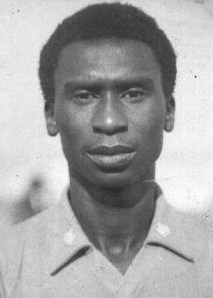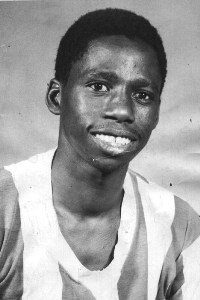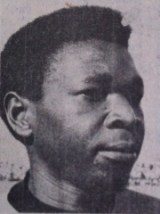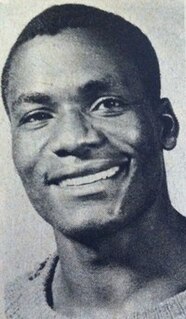Related Research Articles

David Efford Chabala, popularly known as Efford Chabala was Zambia's first choice goalkeeper from 1983 until his death in a plane crash off the Gabonese coast in 1993 and is Zambia's most capped player, with 108 full international appearances. Chabala was instrumental in Zambia's first ever East and Central African Championship success when he saved three penalties in Zambia's 3–0 shoot-out victory over Malawi in the 1984 final in Uganda after a goalless draw at full-time. He was named Zambia's Sportsman of the Year in 1985.

Alexander “Alex” Chola was a Zambian footballer and coach. Voted Zambian Footballer of the Year in 1976, he is regarded as one of the greatest Zambian players in history and is the country's second highest goal scorer after Godfrey Chitalu. He made a mark at Mufulira Blackpool and Power Dynamos before becoming Dynamos coach and winning the Coach of the Year award in 1992. Chola died in a plane crash off the coast of Gabon on 27 April 1993.

Samuel Ndhlovu was a Zambian footballer and coach. Nicknamed "Zoom", he led the "Mighty" Mufulira Wanderers to unparalleled league and cup triumphs for almost two decades. He was named Zambian Sportsman of the Year in 1964 and also served the national team as captain and coach. He is widely regarded as Zambia's best local coach.

Mufulira Wanderers are Zambia's most successful football club, based in the Copperbelt town of Mufulira and currently playing in the Zambia National Division One after their 2019/2020 season relegation.

Kaiser Kalambo was a Zambian coach and former footballer. He represented Zambia in three African Cup of Nations tournaments and was named Zambian captain in 1980, the same year in which he was voted Zambian footballer of the year. He later coached several club sides in Zambia and Botswana.
Dickson Kenneth Makwaza was a Zambian football player and coach. Nicknamed "Barbed-Wire" due to his tenacity in defence, he was one of the most decorated players in Zambian soccer history and was captain of the Zambian national team that made its first ever appearance at the African Cup of Nations tournament in Egypt in 1974. Makwaza also captained Mufulira Wanderers and was voted Zambian footballer of the year in 1973. He later coached Wanderers and several other club sides.

Moses Simwala was a Zambian footballer and coach. Nicknamed 'the chairman,' Simwala featured for Zambia and Rhokana United as a right winger, the same club he would go on to coach for over 12 years and become the most successful coach in Zambian club football, winning the league title a record 8 times and 21 trophies in all. He was voted Zambian coach of the year in 1988 and 1989.
Vincent Chileshe is a Zambian coach and former goalkeeper. He was crowned Zambian player of the year in 1977 at the age of 20, the first goalkeeper to achieve that feat, and was in goal for Zambia at CAN 1978. He is currently coaching Zambian Division 2 side Young Green Eagles.
Jani Liabwa Simulambo is a former Zambian footballer and coach. Nicknamed Be Good, Simulambo had an outstanding career and played at the heart of Zambia’s midfield for close to ten years, representing the country at the 1974 and 1978 African Cup of Nations and was named Zambian captain in 1980.

Freddie Mwila is a Zambian former association football player and coach. Rated as one of the country's greatest players and coaches, he featured for Rhokana United and was one of the first Zambians to play professional football abroad when he joined American side Atlanta Chiefs in 1967. Mwila also played for Aston Villa in England and made an impact as a coach, leading Power Dynamos to the 1991 African Cup Winners' Cup and coached several other club sides as well as the Zambia and Botswana national teams.

Bernard Chanda was one of Zambia's greatest strikers and was the league top scorer three times. Nicknamed 'Bomber,' he played for three of Zambia's biggest clubs – Roan United, Mufulira Wanderers and Rokana United, and is remembered for scoring a hat-trick in the 4–2 semi-final victory over Congo at the 1974 African Cup of Nations tournament. Chanda was voted Zambian Footballer of the Year in 1974 and is fourth on the list of all-time goal scorers for Zambia in international matches behind Godfrey Chitalu, Alex Chola and Kalusha Bwalya with 29 goals.

Dick Chama was a Zambian footballer and coach who played as a centre-back. He was Zambia's defensive stalwart from the late '60s to the mid '70s and formed a formidable central defence pairing alongside Dickson Makwaza and was part of Zambia's squad during the country's very first CAN outing in 1974 and made the official CAF team of the tournament. Chama was voted Zambian Sportsman of the Year in 1975 and after retirement, he coached several club sides as well as the national team.

Tolomeo Mwansa was Zambia’s goalkeeper at independence in October 1964. Nicknamed ‘Juva,’ he won several trophies in a very successful career with the all-conquering ‘Mighty’ Mufulira Wanderers including the 1965 Super Castle Cup against City Wanderers in Salisbury.
Richard Stephenson was one of Zambia's most gifted midfielders who featured during the country's very first Cup of Nations appearance in Egypt in 1974. He captained the 'Magnificent' Kabwe Warriors and was Zambia's footballer of the year in 1971. Stephenson also played for Kitwe giants Power Dynamos later in his career.
Mirade “Kenny” Mwape (1955–2007) was a Zambian goalkeeper and coach. He was Zambia's goalkeeper at the Moscow Olympic Games in 1980 and played for several Zambian clubs including Power Dynamos. Mwape's elder brother Emmanuel also played in goal for Zambia.
Frederick Kashimoto is a Zambian coach and former footballer. A gifted midfielder who won several trophies with Mufulira Wanderers, he also represented Zambia in the 70s and 80s. Upon retirement, he coached several Zambian clubs including Wanderers.
George Lwandamina is a former Zambian footballer and head coach of Azam. He had a brief playing career with Zambia and won several trophies as a defender with Mufulira Wanderers.
Philemon Kaunda was a Zambian footballer who featured for Mufulira Wanderers in the early '80s and also played for Zambia as a central defender. His younger brother Philemon Mulala also played for both Wanderers and Zambia in the same period.
George Sikazwe was a former Zambian footballer and coach, who played for Mufulira Wanderers and Zambia as a midfielder, representing his country before and after independence. He also served as Wanderers' coach and together with Samuel ‘Zoom’ Ndhlovu, he is credited with masterminding the team’s early success.
Philemon Chisala is a former Zambian footballer who featured for Mufulira Wanderers in the late ‘80s and early ‘90s as a defender or midfielder. He also represented Zambia at the 1989 CECAFA Cup and CAN 1990.
References
- 1 2 3 4 5 6 7 8 9 Tembo, Benedict "Ackim Musenge: Hero of 1974!” Zambia Daily Mail, Stars of Yester-year, 4 June 2011, p.10
- ↑ "Anon. "Butondo protest to FAZ over 'exchange'" Times of Zambia, 17 April 1975, p.10
- ↑ Wasa, Mike "New-look Mighty Wanderers thrash Ndola" Times of Zambia, 21 April 1975, p.10
- ↑ Anon. "Buffaloes speak out over 'poach' allegations." Times of Zambia, 9 December 1975, p.10
- ↑ Anon. "Musenge ditches Mighty" Times of Zambia, 15 April 1992, p.10